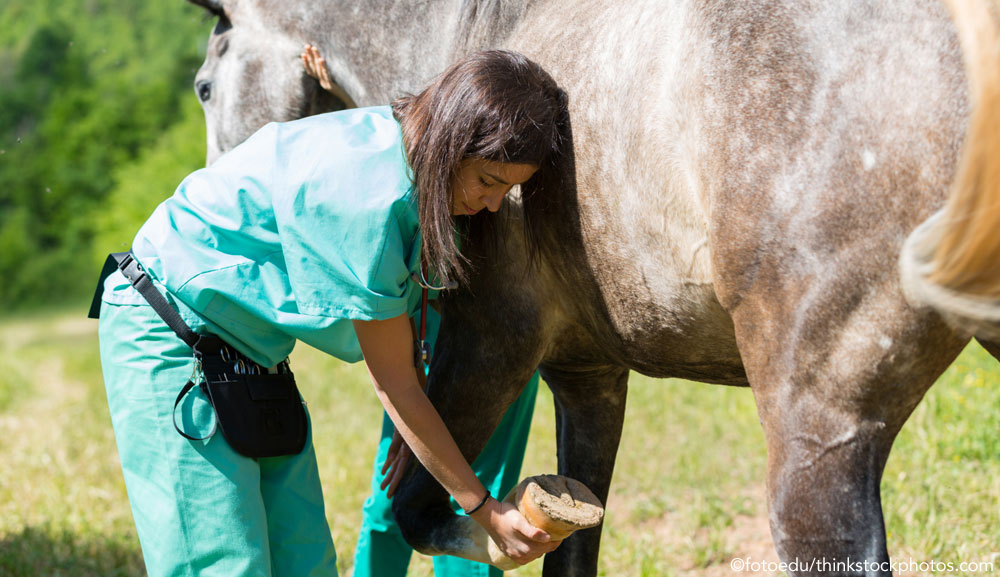Spring Shots for Horses


When your vet comes to the barn, she will do a thorough exam on your horse before vaccinating your horse’s spring shots. The vet will listen to his heart, lungs and belly, assess his body condition, check his teeth, skin, coat and eyes, and take a sample of manure for a parasite exam.
She will discuss his current feeding plan with you and answer any questions you have about his health and care. Your vet may also watch the way your horse moves to check for lameness.


Spring Check Up: Coggins Test
If you are planning to travel with your horse, you will need to have your vet do a Coggins test. This is a blood test for a disease called equine infectious anemia (EIA). There is no vaccine for this disease, but the test is required by law if you travel more than 75 miles or cross state lines.
You will also need a USDA health certificate, which your vet will issue after the Coggins test is completed. Many boarding barns and shows also require a current health certificate and Coggins test.
Spring Check Up: Equine Dental Exam
If necessary, your vet will do dental work on your horse, a medical procedure done under sedation to remove sharp points and correct any problems with damaged or diseased teeth.
The vet will also check and clean the sheath of geldings and the udders of mares while the horse is sedated for the dentistry. Only a veterinarian trained in equine dentistry or a technician under the direct supervision of a vet should perform dentistry on your horse.
Vaccinations for Horses
During a spring check up, it is important to get all spring shots up to date for your horse. Vaccinations can be confusing to owners because there are many different ones available. How do you know which ones your horse needs? There are two categories: core vaccines and risk-based vaccines.
Core vaccines are the ones every horse needs to protect against dangerous diseases that can cause serious problems or even death. The core vaccines protect against Eastern and Western encephalitis (EEE, WEE), rabies, West Nile virus (WNV) and tetanus. Since these diseases can be found across the country, it is recommended to keep all horses current on these vaccinations.
- EEE and WEE are deadly viruses carried by mosquitos and other bloodsucking insects but can also be passed from horse to horse.
- Tetanus is a disease affecting the nervous system caused by the bacteria Clostridium tetani, which can be carried by horses. It can also live in certain soil types. This bacteria can enter the body through wounds.
- West Nile is a dangerous virus carried and passed on by mosquitoes.
- Rabies is a virus carried by wildlife, most commonly skunks, foxes, raccoons and bats, and it is always fatal.
Risk-based vaccines should only be given on the recommendation of your veterinarian. These are given for specific reasons, and may vary from year to year.
The presence of these diseases will vary according to insect populations and the climate, travel and other factors, which is why they are only recommended on an as-needed basis. They include anthrax, botulism, flu, rhino, EVA, leptospirosis, Potomac horse fever, rotavirus and strangles.
Remember that vaccinations are most effective when administered correctly. If the vaccine history of a new horse is unknown, he will need his initial shots boosted in four to six weeks. If you are planning to travel or show your horse, it is generally recommended to boost all needed vaccinations six to eight weeks beforehand to allow immunity to develop and any soreness or swelling from the shots to resolve.
Vaccines will minimize but not prevent the risk of disease. Good management is also necessary to protect your horse. Insect control, minimizing stress and overcrowding and keeping your horse isolated from strange horses from other barns are some good preventative measures that you can take.
Finally, most vaccines are given once a year in the spring season during a spring check up, but some are recommended more often if you are traveling to a different area or exposing your horse to a new barn. So plan ahead with your vet’s advice so you can have a safe and healthy summer!
This article originally appeared in the March/April issue of Young Rider magazine. Click here to subscribe!
Recent Posts
2025 FEI Basel World Cup Finals Hands Reins to Fort Worth 2026
As U.S. athletes look back on valuable experience gained at the 2025 FEI World Cup Finals in Switzerland, the next…
How to Clean a Horse’s Sheath
If you’ve never cleaned a horse’s sheath, you probably have questions. First and foremost, is it really necessary? And more…
All Three Equestrian Sports Receive Final Confirmation for the LA 2028 Olympic Games
After a nail-biting two years of speculation about the inclusion of equestrian sports in the next Olympic Games, it was…
ASPCA Right Horse Adoptable Horse of the Week: Xanthus
Welcome to Horse Illustrated’s weekly installment of the Right Horse Adoptable Horse of the Week, offered in partnership with the…
Be Your Horse’s Joint Health Champion
Equine arthritis can affect horses of all disciplines and ages, and early intervention is crucial for maintaining comfort and performance.…
Tamie Smith: Taking It To The Next Level
Mother, grandmother, and winning 5* eventing rider—these three titles don’t typically go together. However, Tamie Smith, 49, is all of…
View Comments
It is very difficult to take care of such an awesome animal. Vaccinations are a vital part of maintaining any pet. Getting your horse, a tetanus vaccination twice a year is the best option.